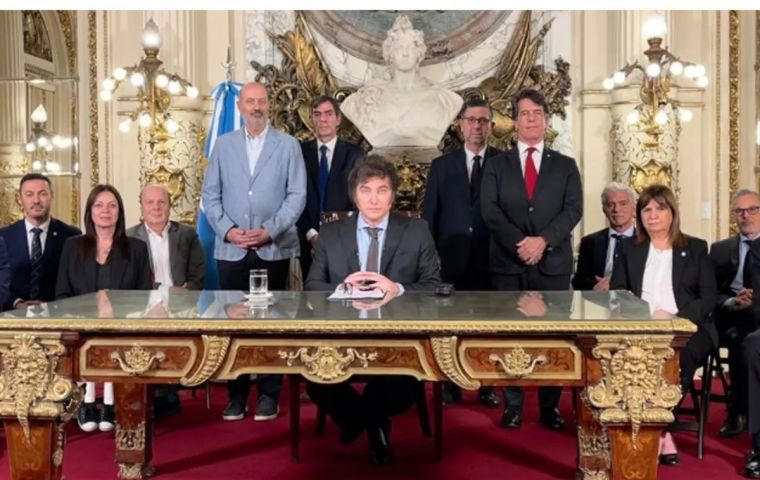MercoPress. South Atlantic News Agency
Argentina: Milei announces mega reform emergency package
 Milei gave his 16-minute speech flanked by his entire cabinet
Milei gave his 16-minute speech flanked by his entire cabinet Argentine President Javier Milei Wednesday announced in a recorded message broadcast at 9 pm -instead of at noon as originally scheduled- an emergency decree containing 366 measures to deregulate the economy, of which he only highlighted 30.
Milei insisted the measure sought to “begin the path of reconstruction of our country, return freedom and autonomy to individuals and begin to dismantle the enormous amount of regulations that have prevented, hindered and stopped economic growth.”
“As our economic model, unlike everything that has been done in the last 100 years, attacks the deficit, which is the cause of our problems, and not the consequences of it, we can begin today to unblock all these regulations that aim to provide solutions, but they only generate problems,” Milei pointed out.
The president noted that his administration was focused on “trying to contain the enormous crisis that we inherited” and therefore a “shock stabilization plan that includes a fiscal adjustment plan, an exchange rate policy that has sincerely approved the exchange rate and a monetary policy that includes the consolidation of the Central Bank” had been launched.
Milei also explained that laws such as ”Góndolas (supermarket shelves), Compre Nacional (Buy Argentine-only products, in place for government offices), The Price Observatory (to monitor compliance with price cap agreements), and the industrial promotion and commercial promotion laws” were to be repealed in addition to the suppression of all regulations preventing state-owned companies from being privatized. Milei also said his government was moving towards privatizing them, particularly Aerolíneas Argentinas while the country was adopting an open skies policy.
The measures announced
1. Repeal of the House Rent Law, “so that the real estate market works smoothly again and renting is not an odyssey.”
2. Repeal of the Supply Law, “so that the State never again attacks the property rights of individuals.”
3. Repeal of the Gondola Law, “so that the State stops interfering in the decisions of Argentine merchants.”
4. Repeal of the National Purchase Law, “which only benefits certain power players.”
5. Repeal of the Price Observatory of the Ministry of Economy, “to avoid the persecution of companies.”
6. Repeal of the Industrial Promotion Law.
7. Repeal of the Trade Promotion Law.
8. Repeal of the regulations that prevent the privatization of public companies.
9. Repeal of the State Companies Regime.
10. Transformation of all State companies into public limited companies for subsequent privatization.
11. Modernization of the labor regime, “to facilitate the process of generating genuine employment.”
12. Reform of the Customs Code, “to facilitate international trade. As of today, it is prohibited to prohibit exports.”
13. Repeal of the Land Law “to promote investments.”
14. Modification of the Fire Law.
15. Repeal the obligations of sugar mills, which they have in matters of sugar production.
16. Liberation of the legal regime applicable to the wine sector.
17. Repeal of the National Mining Trade System and the Mining Information Bank.
18. Authorization for transferring the total or partial share package of Aerolíneas Argentinas.
19. Implementation of the open skies policy.
20. Modification of the Civil and Commercial Code “to reinforce the principle of contractual freedom between the parties.”
21. Modification of the Civil and Commercial Code “to guarantee that obligations contracted in foreign currency must be paid in the agreed currency.”
22. Modification of the regulatory framework of health insurance.
23. Elimination of price restrictions on the health insurance industry.
24. Incorporation of health insurance providers into the social work regime.
25. Establishment of electronic prescriptions to streamline service and minimize costs.
26. Modifications to the regime of pharmaceutical companies to promote competition and reduce costs.
27. Modification of the Companies Law so that football clubs can become public limited companies if they so wish.
28. Deregulation of satellite internet services.
29. Deregulation of the tourism sector “eliminating the monopoly of tourism agencies.”
30. Incorporation of digital tools for automotive registration procedures.




Top Comments
Disclaimer & comment rules-

-

-

Read all commentsWhat do Argentine commentators think about this. Will we finally see Argentines free of the shackles of overbearing Government, it will it just be a different disaster ?
Dec 21st, 2023 - 11:22 am +3Going to be an interesting time in Argentina. It sure needs to start the process of change if they want the country to get back on track. They need to while they are at it remove the illegal sovereignty claim over the British Falklanf Islands and start working with that region and UK rather than against it.
Dec 21st, 2023 - 11:32 am 0The entire country and indeed the entire region would be a much better place if free trade were to happen without embargoes on other countries as Argentina does to the Falkland Islands.
It is this previous attitude that has caused Argentina to end up where it is today.
The Falklands war did remove a military dictator, but it also financially ruined the country. Then further ruined by greedy politicians.
So yes change is vital , but it has to be for all the right reasons. It will take several follow up presidents to make this happen. I doubt the current president will see much of his new plans in his time in office. But let's hope we see a more stable Argentina filled with happiness rather than aggression in the following years.
19. Implementation of the open skies policy. Great, does that mean we can expect passenger exchange charter planes to start? Perhaps even the reinstatement of the Wednesday flight to Sao Paolo?
Dec 21st, 2023 - 05:05 pm 0Commenting for this story is now closed.
If you have a Facebook account, become a fan and comment on our Facebook Page!